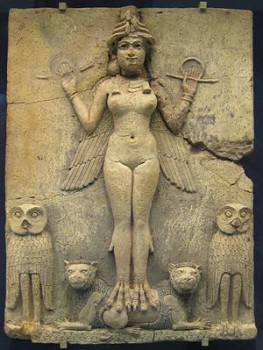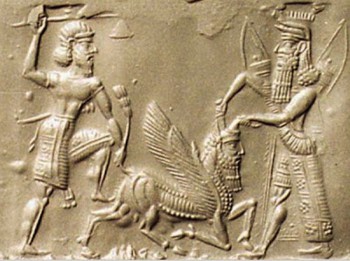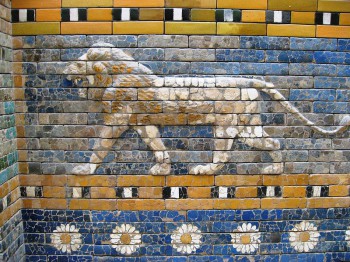Ancient Worlds: Killing the Bull of Heaven
 When you kill the Big Bad, it gets attention.
When you kill the Big Bad, it gets attention.
Gigamesh and Enkidu return to Uruk after Humbaba’s death. Gilgamesh bathes and puts on his royal garments. This effect is so impressive that the goddess Ishtar herself appears before him and begs her to marry him.
If you remember back to the Odyssey, this is a pretty typical motif: the hero who is so manly that goddesses are laid low. But while Odysseus tried to have his cake and eat it too (pardon the expression), Gilgamesh has absolutely no interest in playing nice.
He does not offer Ishtar a polite refusal. He calls her a whore. He lists the many lovers she has had and their terrible fates.
And that is just the beginning. He calls her:
a half-door that keeps out neither breeze nor blast,
a palace that crushes down valiant warriors,
an elephant who devours its own covering,
pitch that blackens the hands of its bearer,
a waterskin that soaks its bearer through,
limestone that buckles out the stone wall,
a battering ram that attracts the enemy land,
a shoe that bites its owner’s feet!
Gilgamesh is really horrible here, and let’s not downplay his raging misogyny-soaked temper tantrum here. But he also has a point. Ishtar has a popular reputation in modern culture that is fairly strongly out of sync with her original incarnations. She was fierce and powerful, yes, but profoundly destructive and terrifying. She was a force of nature, and those crush humans as often as they give them succor. Her previous husbands include Tammus (aka Adonis, who died and is ritually mourned every year), the “Little Shepherd” bird (whom she maimed), the horse (whom she condemned to slavery and the whip at the hands of humans), the lion (whom Gilgamesh says she laid ‘seven times seven traps for’)… in short, she has a terrible and terrifying history with spouses and while Gilgamesh briefly comes across as an MRA on a bad day, he’s not exaggerating.
But he has also committed THE Classic Blunder. No, not land war in Asia. You never, ever, EVER, insult a god directly, no matter how correct you are.
Ishtar complains to Anu, the king of the gods and her father. His response is primarily, “You started it.” But on her insistence, he gives her the Bull of Heaven to loose upon Uruk and claim her vengeance.
The Bull of Heaven is a massive beast. A single strike of its foot against the earth opens up pits that swallow one-hundred men at a time. Enkidu and Gilgamesh make fairly quick work of this beast as well (in a fight that may be more impressive if we had more of it).
And then they do something really, really stupid. Ishtar mourns and wails over the death of the Bull of Heaven. Enkidu and Gilgamesh then cut off a piece of the Bull and throw it at her. One translation renders this as the hindquarters. I’ve seen it listed elsewhere as the bull’s genitals. Either way, it is impossible to miss the insult.
Within a short time, Enkidu is dead. The gods may have ignored Gilgamesh’s slurs against Ishtar’s history, but the act of slaughtering the Bull and insulting a goddess so violently push them over the edge. Gilgamesh is protected (perhaps due to his kingship or his partial divinity), but Enkidu is sentenced to death. We are given no precise details of that fate, only that he falls ill and is dead within ten days.
As readers, we’re struck with a sense of unfairness. Enkidu is the side-kick. He’s the one with, generally, a sense of conscience, the one who calls Gilgamesh to account for his behavior. It seems unfair to us (and to Enkidu as well) that he is the one to pay the penalty for Gilgamesh’s insults against Ishtar.
But on second look, the punishment is leveled against them both. Enkidu goes to Ereshkigal, the queen of the dead. But Gilgamesh is left alone and without Enkidu. His entire sense of himself is shaken: as a human being, he suddenly is face-to-face with the concept of death on a personal level; as a king, he is faced with the absolute fact of his humanity. But being Gilgamesh, it doesn’t stop there.
Next week: Who wants to live forever? GILGAMESH, that’s who.
